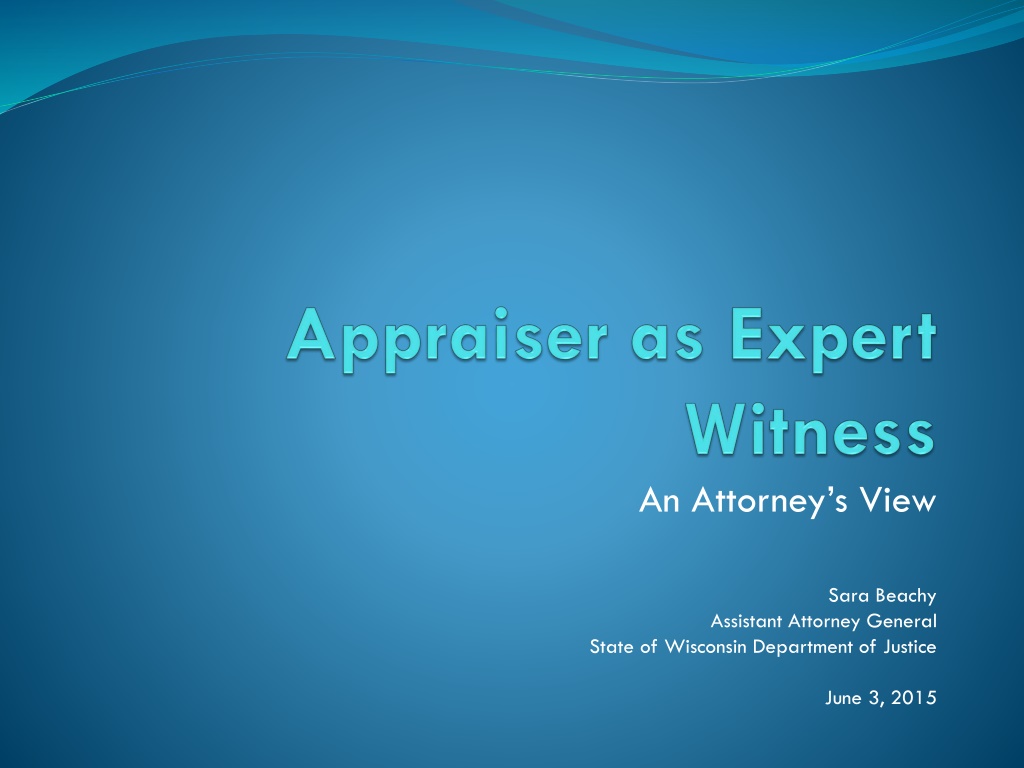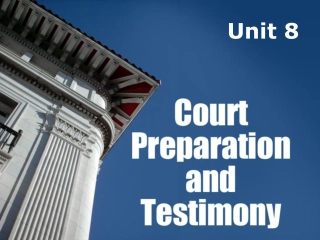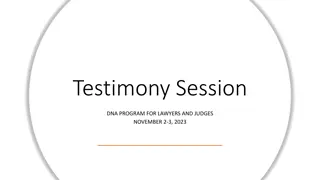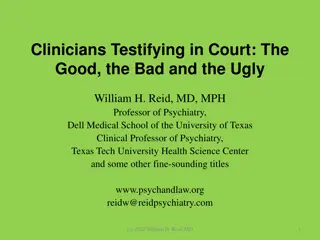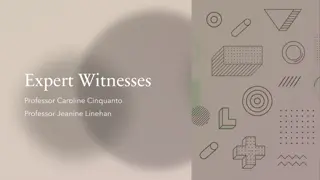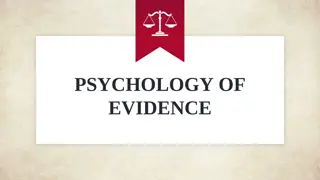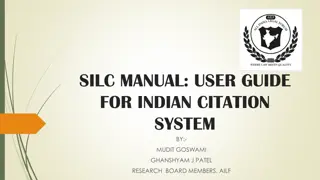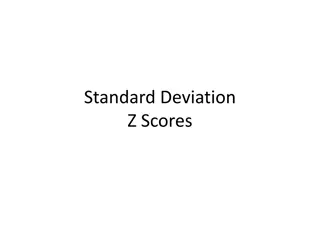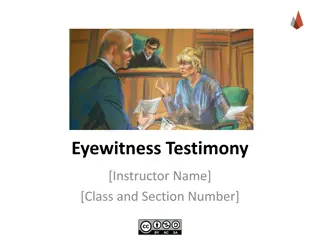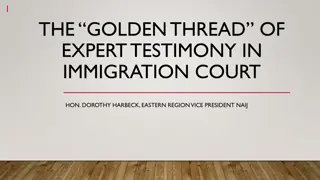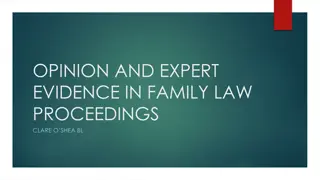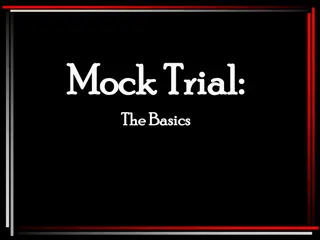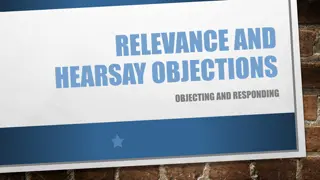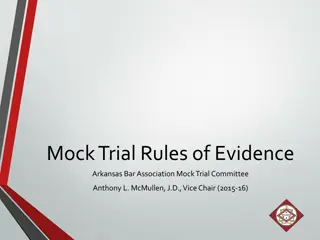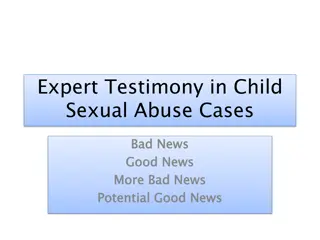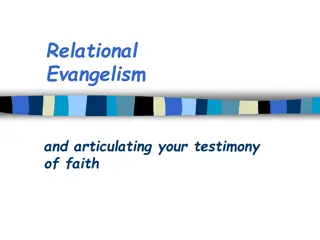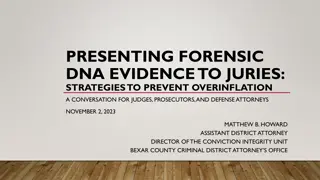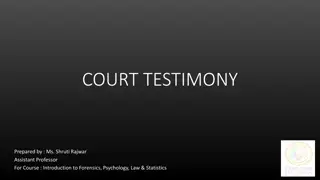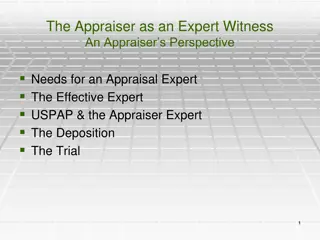Understanding Daubert Standard in Expert Testimony: A Legal Analysis
Explore the Daubert standard for expert testimony, focusing on the rules of admissibility, qualifications, reliability, and methodology. Learn how judges act as gatekeepers to prevent conjecture and speculation in court. Discover the importance of scientific foundation and peer review in expert opinions, with insights on key cases and principles.
Download Presentation

Please find below an Image/Link to download the presentation.
The content on the website is provided AS IS for your information and personal use only. It may not be sold, licensed, or shared on other websites without obtaining consent from the author. Download presentation by click this link. If you encounter any issues during the download, it is possible that the publisher has removed the file from their server.
E N D
Presentation Transcript
An Attorneys View Sara Beachy Assistant Attorney General State of Wisconsin Department of Justice June 3, 2015
To be admissible under Daubert: Appraiser must be qualified as an expert by knowledge, skill, experience, training, or education, AND Testimony must be based upon sufficient facts or data, AND Testimony must be the product of reliable principles and methods, AND The witness must have applied the principles and methods reliably to the facts of the case. Wis. Stat. 907.02(1); State v. Giese, 2014 WI App 92, 356 Wis. 2d 796, 854 N.W.2d 687
Daubert contd As gate-keeper, judge focuses on principles and methodology, not the conclusion Do the scientific principles and methods that the expert relies upon have a reliable foundation in the knowledge and experience in the expert s discipline? Factors: can the scientific approach can be objectively tested? Has it been subject to peer review and publication? Has it been generally accepted in the scientific community?
Flexible but with teeth Goal: prevent jury from hearing conjecture dressed up in the guise of expert opinion No matter how good experts credentials may be, they are not permitted to speculate 1 Coursing through Daubert lore is a palpable fear of ipse dixit ( because I said so ) testimony 2 Under Daubert, the testimony of the witness must be more than subjective belief or unsupported speculation 3 1. Tamraz v. Lincoln Elec. Co., 620 F.3d 665, 671 (6thCir. 2010) 2. Daniel Blinka, The Daubert Standard in Wisconsin: A Primer, Wisconsin Lawyer, March 2011, at 60 3. Ralph Adam Fine, Fine s Wisconsin Evidence 34 (Supp.2012)
Sources of eminent domain appraisal practice/law Wis. Stat. 32.09 (just compensation rules) Wisconsin appellate cases (case law) USPAP, Appraisal Institute publications, others?
Tips for writing an admissible appraisal Personally inspect the property and comps Review applicable zoning ordinances, restrictive covenants, acquisition plat, leases, access control documents, other appraisals, and prior easements, conveyances, and encumbrances Hire supporting experts early, allowing sufficient time to be of use in the appraisal Support adjustments: market data, paired sales, studies, published articles, etc. Don t over-rely on judgment and experience ( because I said so testimony)
Purposes of Deposition Discovery find out all of the expert s opinions and their bases Obtaining admissions Improving settlement posture
Preparation Review your file Appraiser and attorney should discuss the primary disputed areas, strengths and weaknesses, and anticipated areas of questioning Read the other side s appraisal?
Deposition day tips Answer all questions carefully and truthfully. Answer verbally (not with uh-huh or shake/nod of the head). Listen carefully to every question. The best answer is the shortest answer that is complete and truthful. Ask that vague or confusing questions be clarified before you try to answer. Never begin answering before the question is completely stated. Take your time. Think about each question before you start to answer. Do not discuss a document until you have taken as much time as you need to read it carefully.
Tips contd Don t volunteer information. Wait until the question is asked answer it and stop. Do not confuse probability with first-hand knowledge. Stick to what you know. If you do not know, admit it. I don t know or I don t recall are perfectly acceptable answers if truthful. Control your temper. Do not argue with the attorney.
Attorneys should: Narrow and focus on a persuasive theme Understand appraisal testimony being presented Use motions in limine to streamline and educate Emphasize important testimony through signposts/headlines, exhibits, and repetition Start opening, closing, direct, and cross with content that matters most End with content that matters second most
Appraisers should: Understand the key disputes and themes Follow the Grandma Rule Talk to the jury be a teacher Keep answers short and responsive Suggest exhibits and demonstratives and practice using them before trial Be prepared for cross-examination
Use exhibits Before and after aerial subject Aerials of comp sales Aerial map of comparable sales yours and the other side s Maps, plats, surveys use overlaid with aerial background Compensation methods explain to the jury how the appraiser reached his or her conclusion Compilations, charts, graphs Photos of subject and comparable sales Google Earth images
But use them wisely! Think beyond the appraisal report Use technology effectively: visit court room, find the outlets, sit in the jury box, practice using equipment Watch the jury can they see it/do they get it? Consider a jury binder Use stipulated exhibits during opening statement and admitted exhibits during closing argument
Exhibit donts: Don t show exhibits that the jury can t use too small/blurry/fast Don t offer cumulative, misleading, or confusing exhibits Don t pass a paper exhibit around to all 12 (13?) jurors
Or this? Sales Prices (Unadjusted) $900 $779.51 $800 $730.00 $700 $ per square foot $600 $490.70 $500 $458.92 $395.57 $400 $331.83 $296.97 $300 $200 M1 M2 M3 M4 M5 Average Conclusion Comparable Sales
